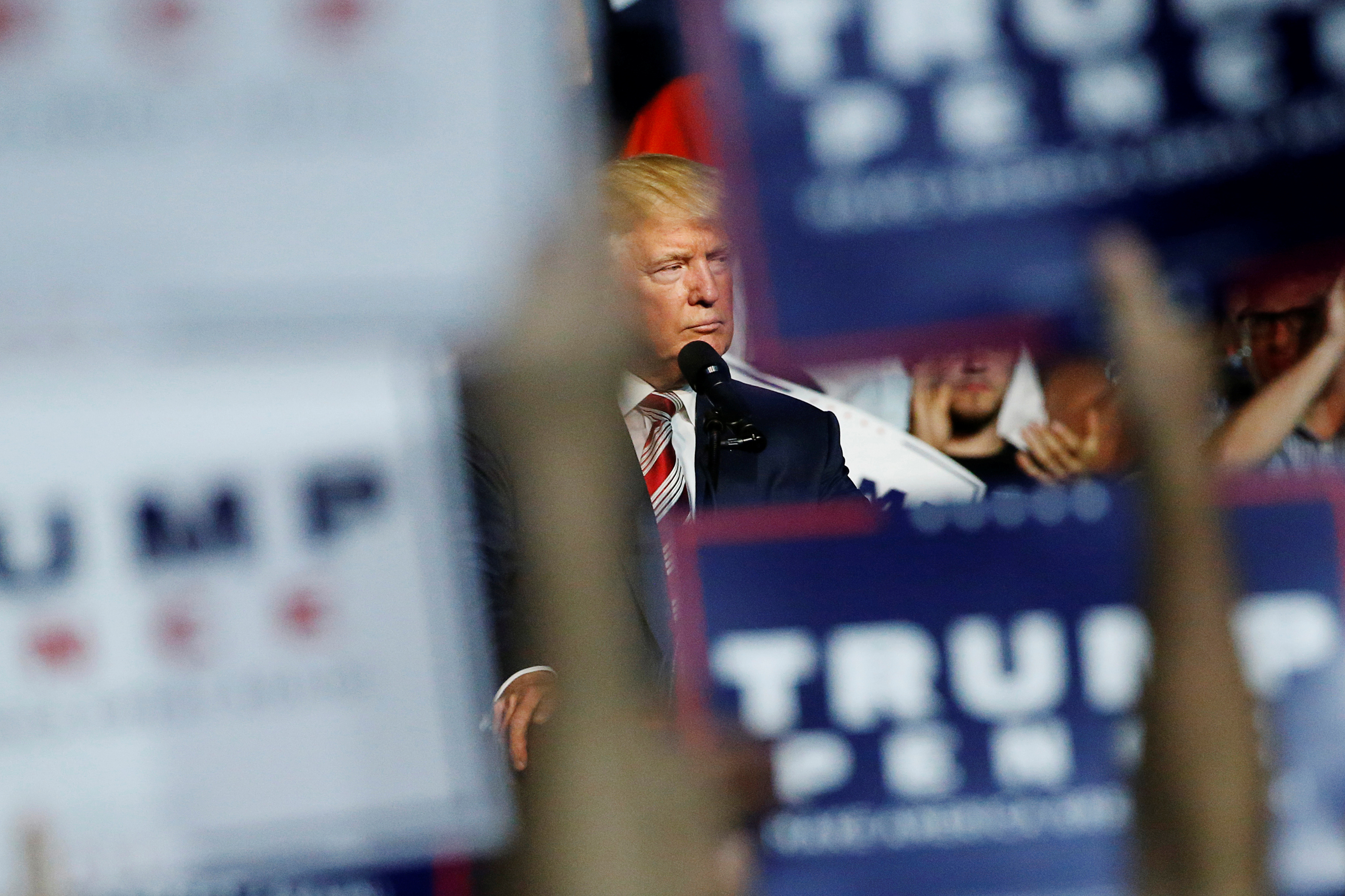How Republicans resolved their cognitive dissonance about Donald Trump, in 1 eye-popping chart
White evangelicals are now totally cool with 'immoral' politicians


A free daily email with the biggest news stories of the day – and the best features from TheWeek.com
You are now subscribed
Your newsletter sign-up was successful
Most of us believe that when we decide whom to vote for, we start with our basic values and beliefs about issues. Only then do we look at the candidates to see who agrees with us, and eventually (perhaps with rest stops at qualities like experience or trustworthiness) arrive at our decision. Even if we might weigh different factors differently depending on what's going on in the world, those values and beliefs aren't going to change — they're the starting point.
Or so you might think. But the truth is that the arrow often moves in the other direction. Once we've signed on with a candidate, that choice can affect what we believe, even at a fundamental level.
This week we learned of an extremely vivid example. Donald Trump's ability to win over white evangelical Protestants has been one of the most interesting and unexpected stories of the campaign, since when it began, many believed there was no way these "values voters" would get behind a libertine New Yorker of little religiosity whose commitment to things like opposition to abortion rights was not only recent but plainly insincere. Yet they did come to support him, even though many of his competitors were much better suited to appeal to them. It may take some time to fully understand all the reasons (some have suggested that it came from the fact that Trump was the candidate who most loudly signaled his support for traditional patriarchy), but there's no question they're with him now.
The Week
Escape your echo chamber. Get the facts behind the news, plus analysis from multiple perspectives.

Sign up for The Week's Free Newsletters
From our morning news briefing to a weekly Good News Newsletter, get the best of The Week delivered directly to your inbox.
From our morning news briefing to a weekly Good News Newsletter, get the best of The Week delivered directly to your inbox.
So are they just holding their noses? I refer you to this remarkable chart from a recent poll by the Public Religion Research Institute:
[[{"type":"media","view_mode":"media_large","fid":"171093","attributes":{"alt":"","class":"media-image","height":"398","typeof":"foaf:Image","width":"600"}}]]
Those with no religious affiliation — a strongly Democratic group — didn't change their beliefs on this question. But the number of evangelicals saying that private morals have nothing to do with performance in office more than doubled.
There's no mystery about what changed between 2011 and 2016: Donald Trump. If you're an evangelical Republican supporting Trump, you faced a particular kind of cognitive dissonance. On one hand, you thought that personal morality matters a lot in public officials. On the other hand, your chosen candidate is someone who cheats on his wives before discarding them for younger ones, says all kinds of vulgar things about women, and also has a long history of unethical business practices. So in order to resolve the dissonance, either you have to stop supporting him, or decide that maybe personal morality isn't all that relevant after all. Evangelicals, at least most of them, seem to have taken the second path.
A free daily email with the biggest news stories of the day – and the best features from TheWeek.com
And it isn't just them. Because of his rather idiosyncratic collection of beliefs and prejudices, Trump has forced Republicans to accept a bunch of things they didn't believe in a couple of years ago. Republicans have warmed to Russia (Vladimir Putin did say nice things about Trump, so…) and decided that free trade is a terrible thing. They've also come to believe that government statistics are lies, as Trump often says; according to a recent Marketplace-Edison Research poll, 48 percent of Trump supporters said they "completely distrust" the economic data provided by the government, compared to only 5 percent of Clinton supporters.
People often shape their beliefs to suit their partisan affiliation; for instance, political scientists have long noted that you're much more likely to say the economy is doing well if the president is from your party, regardless of what evidence you might have in front of you. Think about what that judgment involves right now. Democrats say that we've created 15 million jobs since the Great Recession bottomed out in 2010, unemployment is under 5 percent, incomes are rising, and inflation is practically non-existent (not to mention that a gallon of gas costs only $2). But if you're a Republican, you hate those people, and aren't inclined to believe anything they say.
So when your presidential candidate tells you that we're actually living in an economic nightmare — and all the other politicians and media figures you admire and respect say, "Yes sir, he's right" — it would take a monumental effort to decide that everyone you trust is wrong, and the people you despise are right.
There's no telling whether such newly acquired beliefs will persist after the election is over. My guess is they won't: Once Republicans no longer have to defend Donald Trump, they can go back to believing what they did before. In the same way, when George W. Bush scampered from office with a record of catastrophic bumbling, many loyal Republicans decided retroactively that they never liked him in the first place, and he wasn't a real conservative because he didn't cut spending.
Just to be clear, as a general matter Democrats are no less unsettled by cognitive dissonance and no less likely to revise their beliefs when the moment demands it. But after Nov. 8, it's the Republicans who are going to have so much that they'll want to pretend that they and their party never did, never said, and never believed.
Paul Waldman is a senior writer with The American Prospect magazine and a blogger for The Washington Post. His writing has appeared in dozens of newspapers, magazines, and web sites, and he is the author or co-author of four books on media and politics.
-
 Trump reclassifies 50,000 federal jobs to ease firings
Trump reclassifies 50,000 federal jobs to ease firingsSpeed Read The rule strips longstanding job protections from federal workers
-
 What to watch out for at the Winter Olympics
What to watch out for at the Winter OlympicsThe Explainer Family dynasties, Ice agents and unlikely heroes are expected at the tournament
-
 Properties of the week: houses near spectacular coastal walks
Properties of the week: houses near spectacular coastal walksThe Week Recommends Featuring homes in Cornwall, Devon and Northumberland
-
 The billionaires’ wealth tax: a catastrophe for California?
The billionaires’ wealth tax: a catastrophe for California?Talking Point Peter Thiel and Larry Page preparing to change state residency
-
 Bari Weiss’ ‘60 Minutes’ scandal is about more than one report
Bari Weiss’ ‘60 Minutes’ scandal is about more than one reportIN THE SPOTLIGHT By blocking an approved segment on a controversial prison holding US deportees in El Salvador, the editor-in-chief of CBS News has become the main story
-
 Has Zohran Mamdani shown the Democrats how to win again?
Has Zohran Mamdani shown the Democrats how to win again?Today’s Big Question New York City mayoral election touted as victory for left-wing populists but moderate centrist wins elsewhere present more complex path for Democratic Party
-
 Millions turn out for anti-Trump ‘No Kings’ rallies
Millions turn out for anti-Trump ‘No Kings’ ralliesSpeed Read An estimated 7 million people participated, 2 million more than at the first ‘No Kings’ protest in June
-
 Ghislaine Maxwell: angling for a Trump pardon
Ghislaine Maxwell: angling for a Trump pardonTalking Point Convicted sex trafficker's testimony could shed new light on president's links to Jeffrey Epstein
-
 The last words and final moments of 40 presidents
The last words and final moments of 40 presidentsThe Explainer Some are eloquent quotes worthy of the holders of the highest office in the nation, and others... aren't
-
 The JFK files: the truth at last?
The JFK files: the truth at last?In The Spotlight More than 64,000 previously classified documents relating the 1963 assassination of John F. Kennedy have been released by the Trump administration
-
 'Seriously, not literally': how should the world take Donald Trump?
'Seriously, not literally': how should the world take Donald Trump?Today's big question White House rhetoric and reality look likely to become increasingly blurred
